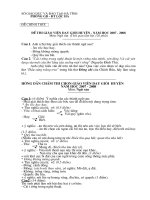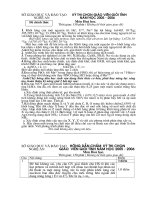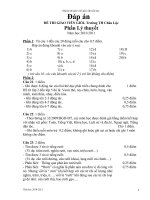ĐỀ THI dự bị và đáp án GVG TỈNH NGHỆ AN môn TIẾNG ANH 2019
Bạn đang xem bản rút gọn của tài liệu. Xem và tải ngay bản đầy đủ của tài liệu tại đây (279.01 KB, 9 trang )
SỞ GIÁO DỤC VÀ ĐÀO TẠO
NGHỆ AN
ĐỀ DỰ BỊ
(Đề có 07 trang)
HỘI THI GIÁO VIÊN DẠY GIỎI TỈNH CẤP THPT
NĂM 2019
ĐỀ KIỂM TRA NĂNG LỰC
Môn: Tiếng Anh
Thời gian: 150 phút (không kể thời gian phát đề)
PHẦN 1. (4,0 điểm)
PHẦN 2. (2,0 điểm)
Anh (chị) hãy sử dụng một phần hay toàn bộ ngữ liệu sau để thiết kế 01 bài tập rèn
luyện các kỹ năng hoặc/và ôn tập kiến thức tiếng Anh cho đối tượng học sinh THPT (tối
thiểu 5 câu hỏi) và đề xuất phương án hướng dẫn học sinh trả lời.
THE MOVIES
The American film critic Pauline Kael gave a 1968 collection of her reviews the title Kiss Kiss Bang
Bang. By way of explanation, she said that the words, which came from an Italian movie poster, were
"perhaps the briefest statement imaginable of the basic appeal of movies." Certainly, they sum up the raw
energy of many American films.
If moving pictures were not an American invention, they have nonetheless been the preeminent
American contribution to world entertainment. In the early 1900s, when the medium was new, many
immigrants, particularly Jews, found employment in the U.S. film industry. Kept out of other occupations by
racial prejudice, they were able to make their mark in a brand-new business: the exhibition of short films in
storefront theaters called nickelodeons, after their admission price of a nickel (five cents). Within a few
years, ambitious men like Samuel Goldwyn, Carl Laemmle, Adolph Zukor, Louis B. Mayer, and the Warner
Brothers - Harry, Albert, Samuel, and Jack - had switched to the production side of the business. Soon they
were the heads of a new kind of enterprise: the movie studio.
The major studios were located in the Hollywood section of Los Angeles, California. Before World
War I, movies were made in several U.S. cities, but filmmakers gravitated to southern California as the
industry developed. They were attracted by the mild climate, which made it possible to film movies outdoors
year-round, and by the varied scenery that was available.
Other moviemakers arrived from Europe after World War I: directors like Ernst Lubitsch, Alfred
Hitchcock, Fritz Lang, and Jean Renoir; actors like Rudolph Valentino, Marlene Dietrich, Greta Garbo,
Ronald Colman, and Charles Boyer. They joined a homegrown supply of actors - lured west from the New
York City stage after the introduction of sound films - to form one of the 20th century's most remarkable
growth industries. At motion pictures' height of popularity in the mid-1940s, the studios were cranking out a
total of about 400 movies a year, seen by an audience of 90 million Americans per week.
During the so-called Golden Age of Hollywood, the 1930s and 1940s, movies issued from the
Hollywood studios rather like the cars rolling off Henry Ford's assembly lines. No two movies were exactly
the same, but most followed a formula: Western, slapstick comedy, film noir, musical, animated cartoon,
biopic (biographical picture), etc. Yet each movie was a little different, and, unlike the craftsmen who made
cars, many of the people who made movies were artists. To Have and Have Not (1944) is famous not only
for the first pairing of actors Humphrey Bogart (1899-1957) and Lauren Bacall (1924- ) but also for being
written by two future winners of the Nobel Prize for literature: Ernest Hemingway (1899-1961), author of the
novel on which the script was based, and William Faulkner (1897-1962), who worked on the screen
adaptation.
Moviemaking was still a business, however, and motion picture companies made money by
operating under the so-called studio system. The major studios kept thousands of people on salary - actors,
producers, directors, writers, stuntmen, craftspersons, and technicians. And they owned hundreds of
theaters in cities and towns across the nation - theaters that showed their films and that were always in
need of fresh material.
What is remarkable is how much quality entertainment emerged from such a regimented process.
One reason this was possible is that, with so many movies being made, not every one had to be a big hit. A
studio could gamble on a medium-budget feature with a good script and relatively unknown actors: Citizen
Kane (1941), directed by Orson Welles (1915-1985) and widely regarded as the greatest of all American
movies, fits that description. In other cases, strong-willed directors like Howard Hawks (1896-1977) and
Frank Capra (1897-1991) battled the studios in order to achieve their artistic visions. The apogee of the
studio system may have been the year 1939, which saw the release of such classics as The Wizard of Oz,
Gone With the Wind, Stagecoach, Mr. Smith Goes to Washington (directed by Capra), Only Angels Have
Wings (Hawks), Ninotchka (Lubitsch), and Midnight.
1
The studio system succumbed to two forces in the late 1940s: (1) a federal antitrust action that
separated the production of films from their exhibition; and (2) the advent of television. The number of
movies being made dropped sharply, even as the average budget soared, because Hollywood wanted to
offer audiences the kind of spectacle they couldn't see on television.
This blockbuster syndrome has continued to affect Hollywood. Added to the skyrocketing salaries
paid actors, studio heads, and deal-making agents, it means that movies released today tend to be either
huge successes or huge failures, depending on how well their enormous costs match up with the public
taste.
The studios still exist, often in partnership with other media companies, but many of the most
interesting American movies are now independent productions. The films of Woody Allen (1935- ), for
example, fall into this category. Critics rate them highly and most of them make a profit, but since good
actors are willing to work with Allen for relatively little money, the films are inexpensive to make. Thus, if one
happens to fail at the box office, the loss is not crushing. In contrast, a movie featuring Tom Cruise or
Arnold Schwarzenegger typically begins with a cost of $10 million or more just for the star's salary. With
multiples of a sum like that at stake, Hollywood studio executives tend to play it safe.
(Extracted from InfoUSA – CD Version)
PHẦN 3. (14,0 điểm)
SECTION A – LISTENING
HƯỚNG DẪN PHẦN THI NGHE HIỂU
• Phần thi nghe gồm 2 phần, mỗi phần được phát 2 lần.
• Mở đầu và kết thúc phần thi nghe có tín hiệu nhạc. Thời gian thí sinh làm bài đã được tính trong nội dung
trong đĩa CD của phần thi nghe.
• Mọi hướng dẫn cho thí sinh (bằng tiếng Anh) đã có trong nội dung trong đĩa CD của phần thi nghe.
Part 1. For question 1-5, you are going to hear a talk which gives more details about the
congestion charging scheme. Complete the notes below. Write NO MORE THAN THREE
WORDS AND/OR A NUMBER for each answer.
When it applies
Monday - Friday, from 7 a.m until (1)______ p.m.
How much it costs
standard: £8
payment after 10 p.m: (2) £______
after midnight: (3)______
How to pay
by telephone
by (4)______
on the internet
at one of the (5)______ Pay Points in the zones.
Part 2: You will hear a part of an interview with a man called Ewan Richardson, who is
trying to persuade people to use less paper. For questions 1-10, complete the sentences
with NO MORE THAN THREE WORDS for each gap.
1. Every year, the average UK citizen uses about ______ of paper.
2. Most of the world’s paper comes from very ______ forests.
3. The production of paper causes terrible ______ in some places.
4. The destruction of the forests is a much bigger cause of global warming than ______.
5. Ewan says that there are already paper recycling bins in many ______.
6. You can use less paper by avoiding unnecessary ______ when you are studying or working.
7. You can often reuse ______ that you have received.
8. To receive less junk mail, don’t ask for ______ when you buy something.
9. Stop receiving any magazines you don’t always read, or ______ them with others.
10. Most ______ published in Britain are now printed on recycled paper.
2
SECTION B – VOCABULARY & GRAMMAR
Choose the best answer (A, B, C, or D) to complete each of the following sentences.
1. The White House has recently announced that they will hold a second _______ near the end of
next month.
A. summit
B. climax
C. gathering
D. appointment
2. It's very important that we _______ as soon as there's any change in the patient's condition.
A. be notified
B. being notified
C. be it notified
D. were notified
3. The food we eat contains thousands of different chemicals. However, only a few dozen of
these chemicals are ______ essential to keep us healthy.
A. absolutely
B. abundantly
C. adequately
D. apparently
4. The teacher spoke highly of such ______ as diligence, modesty, originality and honesty shown
by his students.
A. features
B. virtues
C. properties
D. characteristics
5. It’s going to be tough but we’ll ______ it together.
A. pull out
B. pull down
C. pull through
D. pull on
6. As an ASEAN member, Vietnam has actively participated in the groups programs and has also
created new ______ and cooperation mechanics.
A. initiatives
B. initiators
C. initiations
D. initiates
7. One way to let off ______ after a stressful day is to take some vigorous exercise.
A. cloud
B. tension
C. steam
D. sweat
8. More than 80 people, many of ______ children had pictures on the walls, came to the exhibition.
A. whose
B. whom
C. who
D. which
Choose the most suitable response (A, B, C or D) to complete the following exchange.
9. Mary: “_______”
Jane: "All right, suit yourself."
A. What is your favorite starter?
B. I haven't been to such a nice place with you for a while.
C. Can you help me choose the main course?
D. I don't want to eat anything. I'm on diet.
Choose the word (A, B, C or D) which is OPPOSITE in meaning to the underlined word in
the following question.
10. Head Coach Park Hang–Seo, along with his football team, has achieved unprecedented results
so far.
A. enormous
B. outstanding
C. phenomenal
D. commonplace
SECTION C – READING
Part 1. Read the passage and choose the best answer (A, B, C, or D) to each of the
questions.
The Internet has become a commonplace for us. While (1)______ the Internet, we should
not (2)______ the alarm bells sounding in our ears, reminding us of keeping alert for on-line
crimes. Last year, the Melissa and Explore Zip virus caused chaos (3)______ the Internet. Last
week the “I love you” bug played havoc (4)______ the world. What will be the next? No one
knows.
Many on-line crimes are not so different to (5)______ seen in the real world, the spreading
of fake data, cheating and blackmail, intellectual property rights infringements and privacy
3
violations. But computer hackers also create new forms of crime (6)______ the Internet changes
the world into a “global village”.
With the (7)______ of e-business, on-line crimes could not only cause great damage to
individuals, but could also threaten the (8)______ of national political, economic and cultural
orders. The current legal system in most countries (9)______ weak when dealing with on-line
crimes, due to the sophisticated technology involved. For this reason, many countries are
considering (10)______ Internet laws to curb on-line crimes.
1. A. surfing
2. A. neglect
3. A. in
4. A. over
5. A. which
6. A. until
7. A. blossom
8. A. equality
9. A. proving
10. A. shaping
B. operating
B. overlook
B. on
B. on
B. that
B. before
B. gloom
B. peace
B. proves
B. founding
C. reaching
C. omit
C. inside
C. across
C. them
C. as
C. blooming
C. security
C. prove
C. formulating
D. exploring
D. ignore
D. with
D. through
D. those
D. after
D. booming
D. safety
D. proven
D. setting
Part 2. Read the following passage and choose the correct answer to each of the questions.
The Golden Gate Bridge is one of the symbols of the United States of America. It is
located in San Francisco, California, and spans the Golden Gate Strait - a mile-wide strait that
connects the Pacific Ocean to the San Francisco Bay.
It is surely one of the most beautiful bridges in the world, and also one of the tallest (the
height of a bridge is the height of the towers). The bridge as it is today was designed by
architects Irving and Gertrude Morrow. However their art deco project was not the first Golden
Gate Bridge. The original plans for the bridge were drawn in 1916, but they were a very
complicated and ugly structure, certainly not something America could ever be proud of.
The bridge was a true experiment in its time; such a long suspension bridge had never
been tried before. It had the highest towers, the thickest cables and the largest underwater
foundations ever built. The foundations were a real problem, because they had to be cast in the
depth of more than 100 feet. Extreme depth wasn’t a sole problem. The real challenge lay in the
sinking of the piers in the violent waves of the open sea, which was thought to be almost
impossible. The construction began in 1933, and was finished in 1937, when the bridge opened
to pedestrians. (It was opened to cars one year later). The bridge was finished ahead of schedule
and cost much less than was estimated. Today, the Golden Gate Bridge has a main span of
4,200 feet (almost a mile) and a total length of 8, 981 feet. The towers supporting the huge cables
rise 746 feet above the water. Each steel cable is 7, 650 feet long and has a diameter of 36
inches.
“International orange” is the color the bridge has always been painted. The architects
chose it because it blends well with the span’s natural setting. However, if the Navy had had its
way, the bridge would have been painted black with yellow stripes- in favor of greater visibility for
passing ships.
There are fog horns to let passing ships know where the bridge is, and aircraft beacons
on the tops of the towers to prevent planes from crashing into them.
The Golden Gate Bridge is the first sight for many people approaching the United States
by boats. It is almost the West Coast’s “Statue of Liberty”, and is something everyone should visit
at least once.
1. The Golden Gate Bridge ______.
A. spans the San Francisco Bay
B. spans the Golden Gate Strait
4
C. is the best-known symbol of the United States
D. is painted gold and has a gold- plated gate at the end
2. The first plans of the bridge were ______.
A. designed by Irving Morrow but were too complicated
B. not designed in art deco style
C. something America could be proud of
D. designed by Irving and Gertrude Morrow in 1916
3. The construction of the foundations was very complicated because ______.
A. it was thought to be almost impossible
B. they had to be cast by teams of divers, which was very expensive
C. the piers had to be sunk in the open sea through of violent waves
D. they had to be the largest ones ever built
4. Which of the following is true according to the passage?
A. The construction of the bridge began exactly seventeen years after the first plans were made.
B. The bridge was opened to car traffic in 1939.
C. People were allowed to cross the bridge in 1939.
D. The construction of the Golden Gate Bridge took four years.
5. Which of the following is NOT true about the position of the Golden Gate Bridge?
A. It is off the Pacific Ocean.
B. It is quite near the Statue of Liberty.
C. It is located on the West Coast.
D. It connects the San Francisco Bay to the Golden Gate Strait.
6. The word “cast” in paragraph 3 is closest in meaning to ______.
A. measured
B. expanded
C. exposed
D. thrown
7. The word “blends” in paragraph 4 is closest in meaning to ______.
A. is suitable
B. is outstanding
C. fixes
D. approves
8. The word “beacons” in paragraph 5 can be best replaced by ______.
A. barriers
B. fixed lights
C. decorations
D. structures
9. Which of the following is NOT true about Golden Gate Bridge?
A. The bridge had been expected to cost more than it really was.
B. The bridge was first painted black with yellow stripes.
C. If you travel by boat, it may be the first sight you see.
D. The towers supporting the huge cables rise 746 feet.
10. Passing ships can know where the bridge is ______.
A. thanks to the fog horns.
B. because the bridge is international orange.
C. due to the color decided by the Navy.
D. because there are fog horns and beacons on the top of the towers.
Part 3. You are going to read a set of magazine interviews with four teachers about their
flat-sharing experiences. For questions 1-10, choose from the interviews (A-D). The
interviews may be chosen more than once. Of which teacher are the following statements
true?
1. I might look for a flatmate in the right circumstances.
1. ______
2. Finding a flatmate now would represent a backward step to me.
2. ______
3. I suspect my flatmate considered my behaviour to be odd.
3. ______
4. It is necessary to make compromises when living with other people.
4. ______
5. Talking about housework duties eventually proved to be pointless.
5. ______
6. There were no restrictions on when I could leave and return home.
6. ______
7. It was important to us that the flat was easily affordable.
7. ______
5
8. Sharing a flat can be successful as long as the flatmates have something 8. ______
in common.
9. I was less comfortable after others in the house began to depend on me 9. ______
financially.
10. Setting up in a flat was not as easy as I had expected
10. ______
TWO'S COMPANY, THREE'S A CROWD?
Flat-sharing has long been a tradition in New Zealand, and not just for students. But while there
are those who love the sense of communal living, there are others who can't wait to establish their
own private nest. Lisa Simpson speaks to four teachers.
A. Craig Andrews
The flat-sharing experience has not always been a rewarding one for New Zealander Craig
Andrews. There was, for instance, the time when Craig found himself flat-sharing in Rome while
teaching for a language school. 'The other tenant, an English man, was also working for them.
The big issue was that he was totally uninterested in cleaning. Despite the great many hints I
dropped, he never picked up on them, and so it was all left to me. In retrospect, I suppose he
might have thought I was rather obsessive with my constant cleaning.' Craig felt it necessary to
put up with the situation as their contract with the school had six months to run and he felt that
any confrontation would have ultimately led to greater tension. Craig learnt a valuable lesson from
this experience, which ensured that living arrangements with future flatmates were more
harmonious. 'Provided flatmates' backgrounds are similar and their interests compatible, there's
no reason why it all shouldn't work out well,' he says. 'And just establish the rules from the outset.'
Now a house-owner, however, Craig admits that he can't imagine ever being in a flat-sharing
situation again. 'I realize it’s cheaper but I prefer my privacy and I'm not prepared to give that up.'
B. Derene Els
Having emigrated to New Zealand from South Africa four years ago, Derene is currently living with
her family. 'I pay rent which I know some people might find strange, but it would be morally wrong
not to, especially as I'm working.' She feels that she has her own privacy to a certain extent but
says that 'taking turns with the television remote control, meeting halfway when it comes to the
bathroom schedule, settling for the smaller room when you really want the big one - this is what
you have to do when you're all under the same roof.' Derene is currently keeping an eye out for a
small apartment. Her criteria is simply 'near the coast' as she needs a sense of open space
around her. Perhaps this is what drew her to Australia where she took time off from her job in New
Zealand to work as a translator. After that contract came to an end, she decided to stay on with
the host family who'd been putting her up. 'Once the arrangement became more formal, when I
felt they were relying on me for income, I was not so at ease,' she explains. 'But I still felt obliged
to be sociable and didn't want to appear rude by keeping myself to myself. All the same, I could
still come and go as I wished and the door was never locked.'
C. Sarah Nuttall
Originally from the UK, Sarah has spent the last five years in New Zealand. She's found the local
flat-sharing experience rather different to what she was used to. 'There aren't so many flats
available here,' she explains. 'As well as this, in London the flats are usually fully furnished
whereas in New Zealand you only get a cooker. When my boyfriend and I first got here, it had
never occurred to us that we would have to go out and buy loads of second-hand stuff just to get
started.' She's adamant that there's no room for a third person in her flat. 'We've talked about
getting an extra person in to reduce costs but our privacy comes first. But if I were ever single
again, I suppose I'd consider it. It would be a good way of meeting friends.' Sarah's first flatsharing experience was in London with four friends she'd been to university with. She admits that
there were both good and bad times. 'We hardly ever argued at first except for minor quarrels
6
over the washing up.' Eventually, however, things came to a head when the kitchen became
unusable. 'We had a group meeting and the rules were laid down. They were effective for about
three weeks and then things went back to the way they were.'
D. Callum McNab
Now in the complicated process of looking for his own house, Callum spent his second year of
university flat-sharing with three other students. There was a unanimous decision that the
accommodation had to be within their financial means and in close proximity to the university.
'There were no real disputes. One woman, Cathy, was extremely talkative, so much so you'd end
up not listening. But she was generous and she very much pulled her weight around the flat so we
could live with that.' Callum confesses to little participation when it came to housework. 'There
were times when we'd all pitch in but the problem was that I spent a lot of time away from the flat.
It was agreed that I wasn't as responsible for the messes created and I wasn't going to argue with
that.' When that flat got sold, Callum found the easiest option was to move in with his brother. 'I
can't say I had that much in common with him, except for our interest in foreign movies.' And now
the flat-sharing seems to be coming to an end? 'I couldn't imagine flat-sharing ever again. Living
with a stranger would mean I'd failed in some way, like I was de-maturing.'
SECTION D – WRITING
Part 1. You have just finished a four-week holiday job at a local fair or leisure and
entertainment centre. You enjoyed this experience and want to tell your English penfriend
about it.
Write a letter in 120 - 150 words to your penfriend, describing the work you did and
explaining why you enjoyed it. Use your name and address as Mary Baker, 67 Nguyen Thi
Minh Khai, Vinh city.
Part 2: Write an essay of at least 250 words to express your opinion on the following issue:
Discipline is an ever-increasing problem in many schools in Vietnam. Some people think
that discipline should be the responsibility of teachers, while others think that this is the
role of parents.
Discuss both sides and give your opinion.
Give reasons for your answer, and include any relevant examples from your knowledge or
experience.
- THE END -
7
SỞ GIÁO DỤC VÀ ĐÀO TẠO
NGHỆ AN
HỘI THI GIÁO VIÊN DẠY GIỎI TỈNH CẤP THPT NĂM 2019
HƯỚNG DẪN CHẤM ĐỀ KIỂM TRA NĂNG LỰC
Môn: Tiếng Anh
Thời gian: 150 phút (không kể thời gian phát đề)
ĐỀ DỰ BỊ
PHẦN 1. (4,0 điểm)
PHẦN 2. (2,0 điểm)
Các tiêu chí đánh giá
Điểm
1. Đề bài
Đáp ứng các yêu cầu của bài tập, cụ thể:
- Có hướng dẫn (rubric) rõ ràng, súc tích, dễ hiểu (thể
hiện rõ mục tiêu, yêu cầu, cách thức,… khuyến khích viết
bằng tiếng Anh); đầy đủ số lượng tối thiểu 5 câu hỏi (mỗi
câu hỏi thiếu hay không đáp ứng yêu cầu bị trừ 0,1 điểm)
- Bảo đảm tính khoa học, phù hợp chuẩn kiến thức, kỹ
năng
- Phát triển kỹ năng, năng lực và củng cố kiến thức
của học sinh
2. Phương án hướng dẫn học sinh trả lời
Các tiêu chí đánh giá phương án hướng dẫn:
- Đầy đủ số lượng phương án hướng dẫn cho tất cả các
câu hỏi (mỗi phương án thiếu hay không đáp ứng yêu cầu
bị trừ 0,1 điểm)
- Chính xác, chuẩn về mặt kiến thức (khuyến khích hướng
dẫn bằng tiếng Anh)
- Dễ hiểu, rõ ràng, súc tích
1,0 điểm
0,5
0,25
0,25
1,0 điểm
0,5
0,25
0,25
PHẦN 3. (14,0 điểm)
SECTION A - LISTENING
Part 1 (1,0/20,0 points: 0,2 points for each correct answer)
1. 6.30/half past six
2. 10
3.(automatic) penalty charge
4. text message
5. 200
Part 2 (2,0/20,0 points: 0,2 points for each correct answer)
1. 250 kilos
2. old/ancient
3. pollution
4. Air travel
5. schools
6. printing
7. envelopes
8. more information
SECTION B – VOCABULARY & GRAMMAR
(2,0/20,0 points: 0,2 points for each correct answer)
1. A
2. A
3. A
4. B
6. A
7. C
8. A
9. D
9. share
10. newspapers
5. C
10. D
SECTION C – READING
8
Part 1 (1,5/20,0 points: 0,15 points for each correct answer)
1. A
2. D
3. B
4. C
6. C
7. D
8. C
9. B
5. D
10. C
Part 2 (1,5/20,0 points: 0,15 points for each correct answer)
1. B
2.B
3.C
4. D
6.B
7.A
8.B
9.B
5.B
10.A
Part 3 (2,0/20,0 points: 0,2 points for each correct answer)
1. C
2. D
3. A
4. B
6. B
7. D
8. A
9. B
5. C
10. C
SECTION D – WRITING
Part 1. (1,5/20 points)
Part 2. (2,5/20 points)
Notes:
The mark given to parts 1 and 2 is based on the following scheme:
1. Content: (35% of total mark)
a. Providing all main ideas and details as required
b. Communicating intentions sufficiently and effectively
2. Organization & Presentation: (30% of total mark)
a. Ideas are well organized and presented with coherence, cohesion, and clarity
b. The writing is well-structured
3. Language: (30% of total mark)
a. Demonstration of a variety of vocabulary and structures appropriate to the level of English
language gifted upper-secondary school teachers
b. Good use and control of grammatical structures
4. Handwriting, punctuation, and spelling (5% of total mark)
a. Legible handwriting
b. Good punctuation and no spelling mistakes
9









